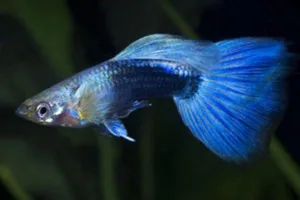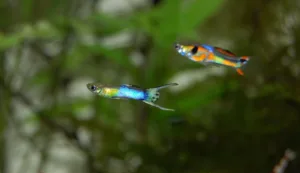Welcome to the world of angelfish, those graceful aquatic beings that often captivate our attention with their elegance and charm. We’ll dive into the fascinating realm of angelfish, debunking common myths and unveiling the truths behind their care and keeping.
Angelfish, with their striking appearance and delicate fins, have long been a favorite among fish enthusiasts. But with this popularity come a set of myths and misconceptions that often swirl around . In this blog post, we’ll unravel these misconceptions and provide you with a clearer, straightforward understanding of these captivating fish.
We’ll start by dispelling the notion that angelfish have an immortal lifespan. While they may appear angelic, they’re not immortal beings, and their lifespan is closer to a decade. The key to their longevity lies in the care they receive. We’ll explore the factors that influence their well-being and the importance of providing them with the right environment.
Next, we’ll debunk the idea that angelfish dine on divine food. In reality, their diet is quite down-to-earth, consisting of common fish food, with occasional treats. We’ll discuss the importance of a balanced diet for their health and vitality.
Angelfish are often perceived as low-maintenance, We’ll uncover the realities of caring for these fish, emphasizing the need for a well-maintained tank and stable conditions.
As we continue, we’ll address their social nature and potential territorial behavior, shedding light on the myth that they get along with all fish. Additionally, we’ll explore the necessity of heaters, debunking the idea that angelfish can thrive without them.
Moreover, we’ll discuss their preference for companionship. Angelfish often thrive in pairs or small groups, and we’ll delve into the reasons behind their social tendencies.
Size matters when it comes to their living space, and we’ll clarify the misconception that they can thrive in small tanks. Providing them with ample room is essential for their well-being.
Lastly, we’ll emphasize the benefits of adding plants to their tank, dispelling the myth that angelfish don’t need them. These plants serve multiple purposes, including offering hiding spots and contributing to water quality.
Join us on this journey through the angelfish myths and realities, as we unravel the mysteries surrounding these captivating aquatic creatures and provide you with the knowledge needed to care for them properly.
Angelfish Live Forever? Not Quite!
When it comes to angelfish, there’s a common misconception that these elegant creatures have an eternal lifespan. In reality, angelfish don’t possess the gift of immortality. Their average lifespan is around 10 years, but like any living being, it can vary. So, let’s dive into the factors that influence their longevity.
1. Quality Care Matters
Angelfish, just like any pet, need proper care to thrive. Ensuring they have a clean and well-maintained tank, a balanced diet, and a stress-free environment can significantly impact their lifespan.
They Eat Angels’ Food: A Fishy Misconception
Another misconception that often circulates is that angelfish have a celestial diet. But in reality, they’re not dining on divine cuisine. Angelfish are quite down-to-earth when it comes to their meals.
2. Common Fish Food
Angelfish happily feast on regular fish food. This includes flakes and pellets designed for tropical fish. These readily available options offer the nutrients they need to stay healthy.
3. Occasional Treats
While angelfish don’t need divine food, they do enjoy an occasional treat. Live or frozen food, such as brine shrimp or bloodworms, can be offered as a special meal.
Angelfish Are Low-Maintenance? The Reality
Angelfish have a reputation for being low-maintenance pets, but it’s essential to understand that “low-maintenance” doesn’t mean “no-maintenance.”
4. The Need for a Well-Maintained Tank
While they might seem easygoing, angelfish require a well-maintained tank. This means regular water changes, monitoring water quality, and ensuring that the tank environment remains stable.
They Get Along with All Fish, Right? Not Exactly!
Angelfish are known for their striking appearance, but they can also be a bit territorial. Assuming they’ll get along with any fish in the tank is a common misconception.
5. Territorial Tendencies
Angelfish can be territorial, especially when it comes to their breeding areas. They might not get along with smaller or more aggressive fish, so choosing their tankmates carefully is crucial.
Angelfish Don’t Need a Heater? The Truth Revealed
Many people believe that angelfish, which originate from warmer waters, don’t need a heater in their tank. However, this is not entirely accurate.
6. Maintaining the Right Temperature
Angelfish do come from warmer waters, but they still need a heater to keep their tank at a consistent and comfortable temperature. Keeping the water between 78-82°F (25-28°C) is ideal for their well-being.
Angelfish Are Loners: The Social Side
Contrary to the misconception that angelfish are solitary creatures, they are actually quite social.
7. Social Creatures
Angelfish usually do better when kept in pairs or small groups. They enjoy companionship and are known to display fascinating social behaviors when housed with their own kind.
They Can Live in Small Tanks: Size Matters
Don’t let the myth mislead you into thinking that angelfish can thrive in cramped quarters. They need enough space to stretch their fins and swim around comfortably.
8. Adequate Space
Angelfish need a tank with sufficient space to accommodate their graceful nature. A tank of at least 20 gallons or more is recommended to provide them with enough room to move around.
Angelfish Don’t Need Plants? Greenery Matters
While angelfish may not be plant-eating creatures, adding aquatic plants to their tank is highly beneficial.
9. Hiding Spots
Plants offer hiding spots for angelfish, which can reduce stress and provide a sense of security. Consider adding some plants to create a more natural and comfortable environment for your angelfish.
10. Water Quality
Plants can help maintain water quality by absorbing excess nutrients and providing oxygen. This contributes to a healthier environment for your angelfish.
Conclusion: Debunking Angelfish Myths
In conclusion, angelfish may not be celestial beings, but they are fascinating creatures that require specific care and attention. Separating myths from reality is crucial for providing these beautiful fish with the best possible life in your aquarium. By understanding their needs, you can create a suitable habitat, ensuring your angelfish thrive and live their best, albeit not eternal, lives. Remember, it’s the responsible care and proper information that will keep these aquatic angels swimming gracefully in your tank for many years to come.
Related post you may like
- Angelfish and Cichlids Compatibility: Finding Harmony in Your Aquarium (November 8, 2023)
- Creating a Stunning Angelfish Planted Tank: A Comprehensive Guide (November 8, 2023)
- Creating the Perfect Aquascape for Angelfish: A Comprehensive Guide (November 8, 2023)
- Understanding Angelfish Behavior and Compatibility in Your Aquarium (November 8, 2023)
- The Beginners Guide On How to Set Up a Angelfish Tank (November 8, 2023)











